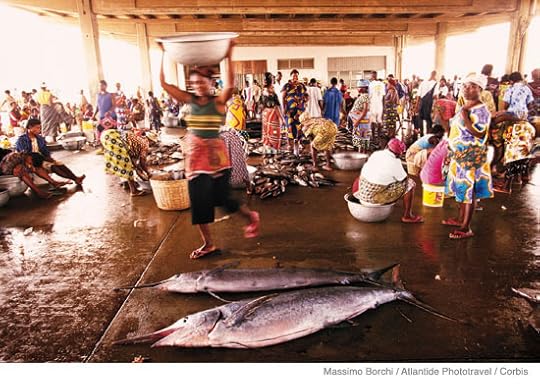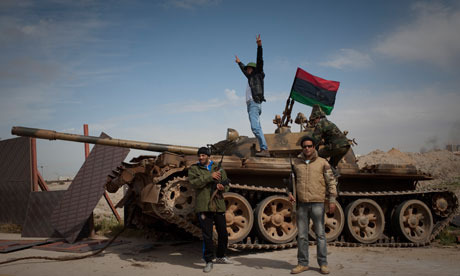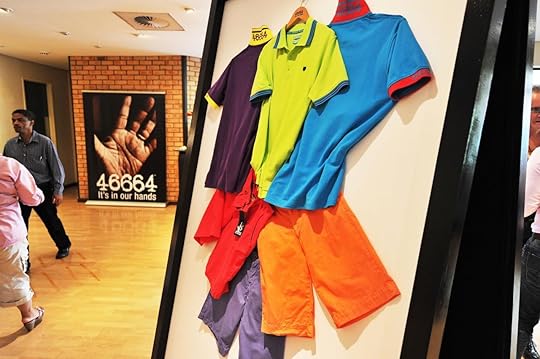Sean Jacobs's Blog, page 666
March 22, 2011
Must Be Something in the Water
Seriously, UNICEF is bottling Rihanna and other celebrities' tap water and selling it.
This is all–to coincide with Water Week–to raise awareness about "… the lack of access to safe, clean water for nearly 900 million children and adults across the globe."
We give up.








South African Roadmovie Part One
On Saturday, 26 March at the Swedish CinemAfrica Festival the film directors Teddy Goitom and Benjamin Taft will premiere their ode to new South African hipsters:"Stocktown South African Roadmovie," a 28 minute film that "sets out to capture the creative street vibes of South Africa." Some of the hipster acts featured in the film include heavy metal band Ree-burth, photographer Musa Nxumalo, Johannesburg"style setters" Smarteez, video gamers label 2bop, rappers Die Getuies [The Witnesses], filmmaker Ebrahim Hajee, and the music of Dirty Paraffin and Gazelle. More information and updates here and here.
* "The first Stocktown documentary series was produced in 2003: a collage of streetculture and urban inventions from Japan, USA, Australia and Europe."
Via Samra Ghermay








March 21, 2011
Libya and the Left
By Immanuel Wallerstein
There is so much hypocrisy and so much confused analysis about what is going on in Libya that one hardly knows where to begin. The most neglected aspect of the situation is the deep division in the world left. Several left Latin American states, and most notably Venezuela, are fulsome in their support of Colonel Qaddafi. But the spokespersons of the world left in the Middle East, Asia, Africa, Europe, and indeed North America, decidedly don't agree.
Hugo Chavez's analysis seems to focus primarily, indeed exclusively, on the fact that the United States and western Europe have been issuing threats and condemnations of the Qaddafi regime. Qaddafi, Chavez, and some others insist that the western world wishes to invade Libya and "steal" Libya's oil. The whole analysis misses entirely what has been happening, and reflects badly on Chavez's judgment – and indeed on his reputation with the rest of the world left.
First of all, for the last decade and up to a few weeks ago, Qaddafi had nothing but good press in the western world. He was trying in every way to prove that he was in no way a supporter of "terrorism" and wished only to be fully integrated into the geopolitical and world-economic mainstream. Libya and the western world have been entering into one profitable arrangement after another. It is hard for me to see Qaddafi as a hero of the world anti-imperialist movement, at least in the last decade. [... ]
This is what the left in the rest of the world sees, if some left governments in Latin America do not. As Samir Amin points out in his analysis of the Egyptian uprising, there were four distinct components among the protestors – the youth, the radical left, middle-class democrats, and Islamists. The radical left is composed of suppressed left parties and revitalized trade-union movements. There is no doubt a much, much smaller radical left in Libya, and a much weaker army (because of Qaddafi's deliberate policy). The outcome there is therefore very uncertain.
The assembled leaders of the Arab League may condemn Qaddafi publicly, but many, even most, may be applauding him privately – and copying from him.
It might be useful to end with two pieces of testimony from the world left. Helena Sheehan, an Irish Marxist activist, well-known in Africa for her solidarity work there with the most radical movements, was invited by the Qaddafi regime to come to Libya to lecture at the university. She arrived as turmoil broke out. The lectures at the university were cancelled, and she was finally simply abandoned by her hosts, and had to make her way out by herself. She wrote a daily diary in which, on the last day, Mar. 8, she wrote: "Any ambivalence about that regime, gone, gone, gone. It is brutal, corrupt, deceitful, delusional."
We might also see the statement of South Africa's major trade-union federation and voice of the left, COSATU. After praising the social achievements of the Libyan regime, COSATU said: "COSATU does not accept however that these achievements in any way excuse the slaughter of those protesting against the oppressive dictatorship of Colonel Gaddafi and reaffirms its support for democracy and human rights in Libya and throughout the continent."
Let us keep our eye on the ball. The key struggle worldwide right now is the second Arab revolt. It will be hard enough to obtain a truly radical outcome in this struggle. Qaddafi is a major obstacle for the Arab, and indeed the world, left. Perhaps we should all remember Simone de Beauvoir's maxim: "Wanting to be free yourself means wanting that others be free."








Music Break
Mandela X-Large
I was hoping it would not come to this.
The Nelson Mandela Foundation has launched an "international clothing line."
The 46664 Apparel line, named after Mandela's inmate number at Robben Island Prison, features colorful clothing that is supposed to make wearers look good on the outside — and feel good inside … [It would boost] South Africa's troubled textile and clothing industry … But many South Africans will not be able to afford the clothing. When the brand is launched in South Africa in August, a T-shirt will cost about 180 rand ($26). A man's collared shirt runs about 600 rand ($86). A quarter of South Africa's work force is unemployed. The minimum monthly wage for a farm worker is 1,300 rand (less than $200) … [L]ast year … Mandela's family, including eldest daughter Makaziwe and grandson Mandla, launched House of Mandela wines. Many were outraged but Mandela gave [that] commercial project his blessing.
Via Africa Didn't Ask You.








China's Nigerian Pop Star
The Nigerian-born performer Emmanuel Uwechue, a k a Hao Ge, has risen to stardom singing in Mandarin Chinese.








Will the 'Real Africa' Please Stand Up?
 Karen Rothmyer writing in this month's Columbia Journalism Review on why NGOs prefer bad news when it comes to Africa:
Karen Rothmyer writing in this month's Columbia Journalism Review on why NGOs prefer bad news when it comes to Africa:
But the main reason for the continued dominance of such negative stereotypes, I have come to believe, may well be the influence of Western-based non-governmental organizations (NGOs) and international aid groups like United Nations agencies. These organizations understandably tend to focus not on what has been accomplished but on convincing people how much remains to be done. As a practical matter, they also need to attract funding. Together, these pressures create incentives to present as gloomy a picture of Africa as possible in order to keep attention and money flowing, and to enlist journalists in disseminating that picture.
Africans themselves readily concede that there continues to be terrible conflict and human suffering on the continent. But what's lacking, say media observers like Sunny Bindra, a Kenyan management consultant, is context and breadth of coverage so that outsiders can see the continent whole—its potential and successes along with its very real challenges. "There are famines; they're not made up," Bindra says. "There are arrogant leaders. But most of the journalism that's done doesn't challenge anyone's thinking."
Over the past thirty years, NGOs have come to play an increasingly important role in aid to Africa. A major reason is that Western donors, worried about government corruption, have channelled more funds through them. In the mid-1970s, less than half a dozen NGOs (like the Red Cross or CARE) might operate in a typical African country, according to Nicolas van de Walle, a professor of government at Cornell, but now the same country will likely have 250.
This explosive NGO growth means increasing competition for funds. And according to the head of a large US-based NGO in Nairobi, "When you're fundraising you have to prove there is a need. Children starving, mothers dying. If you're not negative enough, you won't get funding." So fierce is the competition that many NGOs don't want to hear good news. An official of an organization that provides data on Somalia's food situation says that after reporting a bumper harvest last year, "I was told by several NGOs and UN agencies that the report was too positive."
Rasna Warah, a Kenyan who worked for UN-Habitat before leaving to pursue a writing career, says that exaggerations of need were not uncommon among aid officials she encountered. "They wanted journalists to say 'Wow.' They want them to quote your report," she says. "That means more money for the next report. It's really as cynical as that."
The whole article is worth a read, even though, as American journalist Jina Moore points out in the comments, to go in search of a "real" Africa (as Rothmyer's title suggests) or to frame this discussion in terms of "good" news versus "bad" news coming out of Africa is to engage in the same work of reducing Africa's stories to simplistic narratives. But we'll let Chris Abani tell you about that.








March 20, 2011
File under Found Objects, No. 13
The UK (via Jamaica) toaster, Tapper Zukia's "MPLA" off the album from the same name. Because the song (and the album) came out in 1975, some made links to the Angolan liberation movement, the Movimento Popular de Libertação de Angola, who that same year formed Angola's new independent government (after a protracted liberation war against Portuguese colonial rule). This fan video–with its Cold War and anti-colonial images–contributes to that myth I suppose. Instead, the song was more about Rastafarianism and a reflection of 1970s London black identity politics.
H/T: Tony Karon.








March 18, 2011
This is about Congo
ABC News on Ben Affleck's "time with the people of Congo" and his "odd couple" pairing with Cindy McCain.
There's also this.








March 17, 2011
Music Break
French-Congolese musician Abd Al Malik's star is rising fast in Francophone Europe. Behind his, say, rather straightforward song titles are some revealing lyrics, so we don't mind his songs here being played on the radio over and over again. Above is last year's hit Ma Jolie. Last month he released another great single, Mon Amour, taken from his album Château Rouge. Earbugs, both of them.








Sean Jacobs's Blog
- Sean Jacobs's profile
- 4 followers














